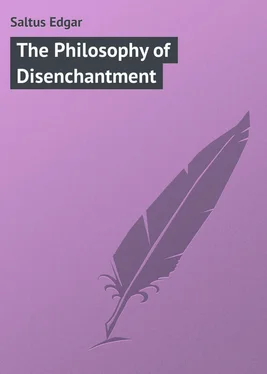Edgar Saltus - The Philosophy of Disenchantment
Здесь есть возможность читать онлайн «Edgar Saltus - The Philosophy of Disenchantment» — ознакомительный отрывок электронной книги совершенно бесплатно, а после прочтения отрывка купить полную версию. В некоторых случаях можно слушать аудио, скачать через торрент в формате fb2 и присутствует краткое содержание. Жанр: foreign_prose, на английском языке. Описание произведения, (предисловие) а так же отзывы посетителей доступны на портале библиотеки ЛибКат.
- Название:The Philosophy of Disenchantment
- Автор:
- Жанр:
- Год:неизвестен
- ISBN:нет данных
- Рейтинг книги:5 / 5. Голосов: 1
-
Избранное:Добавить в избранное
- Отзывы:
-
Ваша оценка:
- 100
- 1
- 2
- 3
- 4
- 5
The Philosophy of Disenchantment: краткое содержание, описание и аннотация
Предлагаем к чтению аннотацию, описание, краткое содержание или предисловие (зависит от того, что написал сам автор книги «The Philosophy of Disenchantment»). Если вы не нашли необходимую информацию о книге — напишите в комментариях, мы постараемся отыскать её.
The Philosophy of Disenchantment — читать онлайн ознакомительный отрывок
Ниже представлен текст книги, разбитый по страницам. Система сохранения места последней прочитанной страницы, позволяет с удобством читать онлайн бесплатно книгу «The Philosophy of Disenchantment», без необходимости каждый раз заново искать на чём Вы остановились. Поставьте закладку, и сможете в любой момент перейти на страницу, на которой закончили чтение.
Интервал:
Закладка:
The life of Leopardi, as told by his biographers, is poetically suggestive of the story of the pale Armide, who burned the palace that enchanted her; and the similarity becomes still more noticeable when he is found hacking and hewing at the illusion of love. Personally considered, Leopardi was not attractive; he was undersized, slightly deformed, near-sighted, prematurely bald, nervous, and weak; and though physical disadvantages are often disregarded by women, and not infrequently inspire a compassion which, properly tended, may warm into love, yet when the body, weak and infirm as was his, incases the strength and lurid vitality of genius, the unlovable monstrosity is complete. Indeed, in this respect, it may be noted that while the love of a delicate-minded woman for a coarse and stupid ruffian is an anomaly of daily repetition, there are yet few instances in which genius, even when strong of limb, has succeeded in inspiring a great and enduring affection.
Against Leopardi, then, the house of love was doubly barred. When he was about nineteen, he watched the usual young girl who lives over the way, and with a naïveté which seems exquisitely pathetic he made no sign, but simply watched and loved. The young lady does not appear to have been in any way conscious of the mutely shy adoration which her beauty had fanned into flame, and at any rate paid no attention to the sickly dwarf across the street. She sat very placidly at her window, or else fluttered about the room humming some old-fashioned air. This went on for a year or more, until finally she was carried away in a rumbling coach, to become the willing bride of another.
This, of course, was very terrible to Leopardi. Through some inductive process, which ought to have been brought about by the electric currents which he was establishing from behind the curtain, he had in his lawless fancy made quite sure that his love would sooner or later be felt and reciprocated. When, therefore, from his hiding place he saw the bride depart in maiden ignorance of her conquest, and entirely unconscious of the sonnets which had been written in her praise, the poet's one sweet hope faded slowly with her.
This pure and sedate affection remained vibrant in his memory for many years, and formed the theme of so many reveries and songs that love finally appeared to him as but another form of suffering. In after life, when much of the lustre of youthful candor had become dull and tarnished, he besieged the heart of another lady, but this time in a bolder and more enterprising fashion. His suit, however, was unsuccessful. It may be that he was too eloquent; for eloquence is rarely captivating save to the inexperienced, and the man who makes love in rounded phrases seems to the practised eye to be more artistic than sincere. At all events, his affection was not returned. The phantom had passed very close, but all he had clutched was the air. He was soon conscious, however, that he had made that mistake which is common to all imaginative people: it was not the woman he loved, it was beauty; not woman herself, but the ideal. It was a conception that he had fallen in love with; a conception which the woman, like so many others, had the power to inspire, and yet lacked the ability to understand. This time Leopardi was done with love, and forthwith attacked it as the last, yet most tenacious, of all illusions. "It is," he said, "an error like the others, but one which is more deeply rooted, because, when all else is gone, men think they clutch therein the last shadow of departing happiness. Error beato," he adds, and so it may be, yet is he not well answered by that sage saying of Voltaire, "L'erreur aussi a son mérite"?
It was in this way that Leopardi devastated the palace from whose feasts he had been excluded. At every step he had taken he had left some hope behind; he had been dying piecemeal all his life; he was confessedly miserable, and this not alone on account of his poverty and wretched health, but chiefly because of his lack of harmony with the realities of existence. The world was to him the worst one possible, and he would have been glad to adorn the gate of life with the simplicity of Dante's insistent line, —
"Lasciate ogni speranza voi ch'entrate."
"There was a time," he said, "when I envied the ignorant and those who thought well of themselves. To-day, I envy neither the ignorant nor the wise, neither the great nor the weak; I envy the dead, and I would only change with them."
This, of course, was purely personal. Toward the close of his life he recognized that his judgment had been in a measure warped by the peculiar misfortunes of his own position, but in so doing he seemed almost to be depriving himself of a last, if sad, consolation. Nor did he ever wholly recant, and it is in the conception of the universality of misery which stamped all his writings, and which, even had he wished, he was then powerless to alter, that his relation to the theoretic pessimism of to-day chiefly rests.
As a creed, the birthplace of pessimism is to be sought on the banks of the Ganges, or far back in the flower-lands of Nepaul, where the initiate, with every desire lulled, awaits Nirvâna, and murmurs only, "Life is evil."
Now, as is well known, in every religion there is a certain metaphysical basis which is designed to supply an answer to man's first question; for while the animal lives in undismayed repose, man of all created things alone marvels at his own existence and at the destruction of his fellows. To his first question, then, What is life and death? each system attempts to offer a perfect reply; indeed, the temples, cathedrals, and pagodas clearly attest that man at all times and in all lands has continually demanded that some reply should be given, and it is perhaps for this very reason that where other beliefs have found fervent adherents, neither materialism nor skepticism have been ever able to acquire a durable influence. It is, however, curious to note that in attempting the answer, nearly every creed has given an unfavorable interpretation to life. Aside from the glorious lessons of Christianity, its teaching, in brief, is that the world is a vale of tears, that nothing here can yield any real satisfaction, and that happiness, which is not for mortals, is solely the recompense of the ransomed soul. To the Brahmin, while there is always the hope of absorption in the Universal Spirit, life meanwhile is a regrettable accident. But in Buddhism, which is perhaps the most naïve and yet the most sublime of all religions, and which through its very combination of simplicity and grandeur appeals to a larger number of adherents than any other, pessimism is the beginning, as it is the end.
To the Buddhist there is reality neither in the future nor in the past. To him true knowledge consists in the perception of the nothingness of all things, in the consciousness of —
"The vastness of the agony of earth,
The vainness of its joys, the mockery
Of all its best, the anguish of its worst;"
and in the desire to escape from the evil of existence into the entire affranchisement of the intelligence. To the Buddhist, —
… "Sorrow is
Shadow to life, moving where life doth move."
The Buddhist believes that the soul migrates until Nirvâna is attained, and that in the preparation for this state, which is the death of Death, the nothingness of a flame extinguished, there are four degrees. In the first, the novitiate learns to be implacable to himself, yet charitable and compassionate to others. He then acquires an understanding into the nature of all things, until he has suppressed every desire save that of attaining Nirvâna, when he passes initiate into the second degree, in which judgment ceases. In the next stage, the vague sentiment of satisfaction, which had been derived from intellectual perfection, is lost, and in the last, the confused consciousness of identity disappears. It is at this point that Nirvâna begins, but only begins and stretches to vertiginous heights through four higher degrees of ecstasy, of which the first is the region of infinity in space, the next, the realm of infinity in intelligence, then the sphere in which nothing is, and, finally, the loss of even the perception of nothing. When Death is dead, when all have attained Nirvâna, then, according to the Buddhist, the universe will rock forevermore in unconscious rest.
Читать дальшеИнтервал:
Закладка:
Похожие книги на «The Philosophy of Disenchantment»
Представляем Вашему вниманию похожие книги на «The Philosophy of Disenchantment» списком для выбора. Мы отобрали схожую по названию и смыслу литературу в надежде предоставить читателям больше вариантов отыскать новые, интересные, ещё непрочитанные произведения.
Обсуждение, отзывы о книге «The Philosophy of Disenchantment» и просто собственные мнения читателей. Оставьте ваши комментарии, напишите, что Вы думаете о произведении, его смысле или главных героях. Укажите что конкретно понравилось, а что нет, и почему Вы так считаете.












